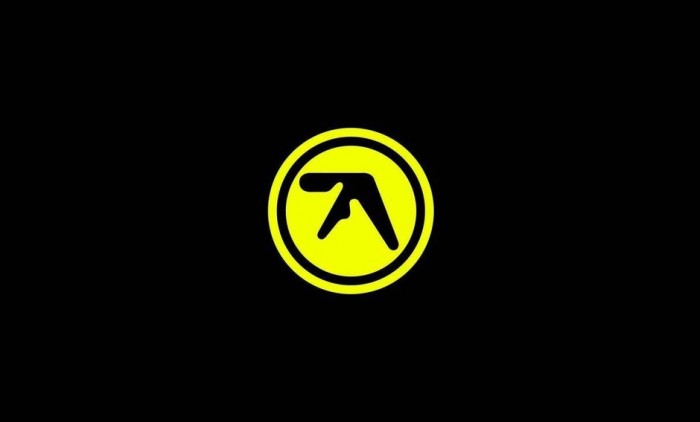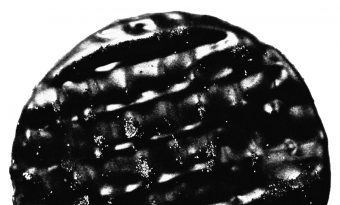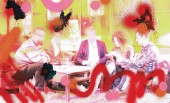If it was anyone else, it would be the album of the year. But there’s expectation here. There’s a lot of weight riding on this. Aphex Twin is the doyen of experimental rowdy electronica. There’s a very real sense that if it wasn’t for him, we wouldn’t have anything that we have now. The scale of ceremony and occasion around the release of the album has tried to make it clear. This is important.
Everyone keeps saying we haven’t seen an album from him since Drukqs, 12 years ago (actually, I would call Chosen Lords an album, and quite an important one in calculating the genealogy of the record in hand, but I’ll get to that). Richard himself appears to actually be a bit more up-front than usual though; his recent Pitchfork interivew is remarkably open and honest, if slightly frustrating for the eager, in that he implies that he would be releasing loads of stuff all the time if someone just bothered to ask him.
But none of that matters. Really, it’s down to the music. It doesn’t matter that my record came in a specially printed Syro plastic bag. It doesn’t matter that there have been blimps flying over UK cities and track lists circulating on the deep web. It should all be about the music. It even seems to be present in the tracklisting, which appears to be exposing his own densely convoluted filing system. Track names are made up words, backwards names and bits of equipment followed by, and infected by, strings of numbers and symbols (and faintly onomatopoeic mix titles). I think it’s just literally a bundle of file names sent to Warp, including BPMs and notes about pitchshifts and keys and the like.
Let’s leave it to others to puzzle out. Let’s get to the music. I promise we’ll get to the music.
Aphex Twin feels like a heritage artist to a lot of us. For me personally, he’s an icon of something special and strange I discovered, around the same time I discovered recreational drug use. Aphex taught me how strange and powerful music could be. He showed me how expectations could be battered into submission by clattering broken drums. This belief in being overwhelmed is still close to my heart. I seek out music that hurts my ears and makes my brain dance.
I think a large part of that is down to Aphex. I remember Drukqs coming out, and trying to puzzle my way through the smorgasbord of haunting piano (prepared and not) and brutal sonic assaults. I appreciated being thanked for my attention. I paid closer attention. I tore that record apart with my ears and sprinkled it through my life. I dug out his back catalogue, his rave-based classics, his ambient colour schemes. I trawled the music press for ridiculous anecdotes. He’s got a tank. He lives in a windmill (like Jonathan Creek). He plays live gigs where he gets algorithms to make all the music so he can just watch people react. He took apart and rebuilt his family piano at the age of four.
There’s even a new one of those. His five year old son (the album is named for a word made up by the child) has already put out music on Bandcamp.
But it doesn’t matter. All this expectation, hype and history is nothing. It’s all about the music.
Like I said, if this was anyone else, it would be the album of the year. And actually, even if it doesn’t redefine the universe the way he did when I was little, it probably still could be. Taken away from everything else, this is a stunning achievement. A series of explosively endearing tracks, immaculately put together, that will make your brain and body move in ways it isn’t always possible to move.
You might need some warnings. The beats never get hectic enough to feel like Drukqs, or either of the seminal ‘albums with his face on the front’, Richard D James and I Care Because You Do. There’s little creeping horror, either. These are songs to delight you, rather than damage or destroy you. There is no dread here.
On first listen, this is a disappointment. And there’s a part of me that misses that.
Like I said earlier, this is in the lineage of the Analord series, or of the early rave classics. It’s most clearly evinced in the drum beats. Almost all of the percussive elements throughout the album are (relatively) straightforward. There’s a chopped up Amen or two (‘s950tx16wasr19′, for example), but that’s not the basis here. Pretty much every track is based on a crisp, perfect, simple drum beat.
This doesn’t make it any less rhythmically interesting. In fact, it brings to the fore one of James’ most interesting musical fingerprints. The pounding momentum of a track is just as likely to be provided by a shifting synth filter as it is a falling apart drum kit. Auto pans, hard cutoffs and those weirdly hallucinogenic quick fades to silence, they make up as much of the rhythm section as the drums do. Synth loops and basslines kick just as hard as drums. Clever production makes silences as violent as noises. His alchemical production transmutes effects into percussive madness.
Let’s get into specifics.
‘Minipops’ (I’m going to start stripping out the weirdnesses of the track names, and just call them the things people are most likely to call them) opens up the album. You’ve heard it already (this being an age where Aphex gets radio play). It’s largely striking because it sounds a bit like a Plaid track that’s melting. The warmth of the synth pads, the playful raindrop motifs, all with a simple but rigidly powerful broken beat underneath. It drifts, then it punches forward, then it drifts again. It’s utterly lush. I even found myself attempting to sing along last night. There is a vocal, a slowly twisting wordless mass. It’s gorgeous. It’s such a perfect counterpoint to the throbbingly inviting inhumanity underneath it.
‘Xmas eve’ is a much longer journey. Another creepy inaudible voice opens up, then a synth intro, before the slightly detuned piano hook opens up for business. It feels like a nod to early house, but it’s laid back enough to almost be someone just pushing randomly at a piano. The underpinning beat is simple and perfect. The atmosphere is set by slowly shifting reverb from the piano, acting as a music fog, whilst bassline synth starts driving itself forward. It’s a really rich set of textures. It’s a real head-nodder. Gentle, warm, faintly haunting. The piano is longing for something, you can only hope the increasingly driving bassline is taking it there.
There’s a blissful breakdown. No drums, all rhythm provided by synth. The bassline left to grow and expand and grind itself into your privates. It’s so physical, and it stays broken down long enough to drive it right into you. It’s a laid back kind of filth. It’s dirty sex with someone you love, rather than back alley passion with a stranger.
I can’t believe I managed to get that far into an Aphex Twin album review without talking about music as if it was sex. Are you proud of me, Kier? [proud and surprised – Ed.]
I might have to leave that sitting there for a while, move on. It does settle down quite quickly. The breakdown is just a raunchy pitstop before you’re back on the beautiful open road. It does appear Richard had a pretty lovely Christmas Eve that year.
‘Produk 29’ doesn’t do much. It’s a lovely little acidic bounce, with a few slightly disconcerting samples of female voices talking about clubbing and calling someone a whore. It’s got an edge of creepiness, not the easiest thing to define, but it’s still present through the album, and it’s a little more obvious here. Something about the track feels like it’s hiding, listening in on these women. At one point the bass stops and a little bit of drum fill is left behind. It’s striking, but it’s all a bit simple. It’s the first indicator that there is filler on this album. Highest grade filler, but it basically just sits there.
We’ll jump ahead a bit, because I really don’t want to do a track by track, so we’ll go where I most want to be. A terrifying nightclub, which might not have a floor.
‘180db’ is the purest rave track on the album. It’s also faintly terrifying, in a woozy, half-drunk kind of way. It reminds me most of that feeling when you’re in bed, going to sleep, and you briefly feel like you’re falling over and wake up with a start. Imagine you’re in a huge sweaty elegaic rave, and every single person there is doing that over and over again. It’s quite a trick. You will probably reach your hands into the air during your first listen. You will probably also feel a little bit hypnotised by the whole thing. It’s one of the simplest tracks on the album, just a pounding 4/4 beat (either simple kick or simple breakbeat depending where you’re at in the song) and a lurid, falling fuzz of synth riff. It sounds like something swimming around your head. Constantly falling down. It fades, it returns, it creeps you out, it makes you want to dance. I think it might be trying to tell you something about the rave scene. The slow creeping awfulness of knowing that the fantasy of escapism contained in that particular combination of pills and lasers will run out eventually, and you will fall down.
Alternatively, it’s just a bit of a banger.
‘Circlont6a’ is my highlight. A fiddly beat, one of the bolshiest on the record, overlaid with an utterly irresistible, and overwhelmingly complex, array of bleeps, squelches and blurs. This is Aphex doing what he does best. Toying with your brain using filters, effects, multiple interlocking melodies, and rhythms that build up organically out of the sum total of the sound. Also, every minute you get a fundamental shift. The song does not rest, it shifts and moves, taking you from place to place. Motifs return, but re-contextualised – they are totally different.
Aphex’s greatest mastery is in really showing you, if you pay attention, that each individual part is not what you are hearing. The same things can appear totally different depending on how much other sound they are wrapped in and around. Every moment is more than the sum of its parts, built on expectation, texture and steadily shifting goalpoasts. You wil hear moments in ‘Circlont6a’ that you will recognise from old tracks. It has ‘Smojphace’ smudges all over it, but here they are new, fresh and strange again. Each beat and synth expertly curated, every moment crafted for hours. Heart and soul poured into it.
Its only problem is ending too soon. Leaving you with a raw and punchy drum beat that just stops, almost as soon as it’s been exposed.
‘Circlont14’ is an odd one. Largely because for me it feels more like a Squarepusher track than an Aphex Twin one. Teen muso me was constantly debating with friends the relative merits of the two: Squarepusher’s fleshy flailing versus Aphex’s surgical brutality. ‘Circlont14’ squares the circle a little. It’s got some of that playful bounciness that Tom Jenkinson’s bass always brought to the table. It tries to do too many things at once, and gets away with it. It swaggers and runs at the same time, occasionally taking a breath for some delicate synth loneliness. Another incomprehensible voice haunts the midsection, before the beat drops back in and the gap fills up. As before, the track drifts a little, letting you rest in a way Aphex rarely used to, but it still finds somewhere to go, and it all still feels measured and erratic, somehow.
Title track (if you ignore the numbers) ‘Syro’ is pretty blissful. A cop movie/computer game synth part provides a motif the rest hangs around, and it’s delightful. Just a simple(ish) melody, contorted into a million different shapes. Passed from synth to synth, effect to effect, variable to variable. Beats burst around it, delicate, playful and occasionally pounding. When it breaks down a little, a middle eight almost (and the drums are willing to go down some pleasingly cheesy holes), it feels like it’s opening up into something so warm and homely that you can’t help but feel in love. This is a delightful, delightful track, on a delightful record.
Delight. It’s not something that you often associate with Aphex Twin. There’s always been transcendently warm moments. ‘Fingerbib’, ‘Alberto Balsam’, even the clattering ‘Girl/Boy Song’. But this is such a warm thing.
It’s the analogue, of course. The chap is still obsessed with the sounds he can stretch out of those synths. The root of all that warmth. The depth of all that noodling. The sheer loveliness of all those sounds. It all comes from those analogue synthesisers. Not content with the Analord series, 12(?) vinyl releases honouring the analogue acid sounds, he’s written his second love letter to the synthesisers he adores. It’s clear throughout the album, but in ‘Syro’ and ‘Papat4’ most of all. That delight shines through.
‘Papat4’ is where you come if you want those aggressive beats that are often missing from the rest. Again, it takes plenty of cues from Tom Jenkinson, but by wrapping everything in a particular sort of analogue warmth, it’s clearly a work of Aphex craftsmanship. It’s interesting, those arguments about who was best; for me they always boiled down to ‘Squarepusher is an musician, Aphex a composer.’ Squarepusher played the bass, Aphex programmed machines. It’s probably always been wrong, but I feel it’s proven so here. Aphex doesn’t program those machines, he plays them. He plays them. And then he plays you too. There’s a concrete awareness of how he is pushing those buttons to push your buttons.
Second to last comes all the broken breaks you could ever ask for. Chopped up, thrown about, and delivered straight to your door. This is the closest the album gets to those tumultuous percussive opuses from Drukqs. The lengthy, concerted pounding down of the doors of perception. But even here, things level out into a few analogue bubble baths.
Don’t go into this record looking for the Aphex you used to know. Come here looking for music, and you’ll be treated. Perhaps it isn’t experimental enough. Perhaps it isn’t as wild and ground-breaking as you remember; in fact, I’d even say probably. But why should someone who has been making this music for thirty years be expected to still be the absolute cutting edge. The truth is, I don’t think he ever set out to save music. He just set out to make music.
Here, Aphex Twin makes music, and it’s great wonderful music. If you aren’t happy with that, then you’ve got some weird things going on.
‘Aisatsana’ is a perfect coda. Just a simple piano piece, steadily repeating, reassuring. Birds tweet in the background but the piano, not just the notes but the crunch of its mechanism, fills all the available space. You can’t get more analogue than this, and you can see just how affecting his melody and harmony writing is when it’s left to stand alone like this. A warm, melancholy sadness hangs in the air. You could buy the album for this piano alone, and get a good deal. It is simple. It is perfect. I particularly enjoy its final punctuation, a final twang of double bass as a full stop on the final note.
There is no doubt that Aphex Twin is one of the finest composers out there. You shouldn’t need to read a review to know that this album is necessary and important. It will beckon you into it, send shivers down your spine (scary, heartbreaking and delightful shivers). After your second listen you’ll already feel like you’re returning home. A home you may not have been to for a while, but home nonetheless. It will fully meet your expectations, and it will let you down a little.
This is okay. Stop expecting. Just listen.
Because the world is beautiful, and it has beautiful sounds in it. And Aphex will gladly dig out some of them for you.
Alex Allsworth






Follow us
Follow us on Facebook Follow us on Twitter Follow us on Google+ Subscribe our newsletter Add us to your feeds